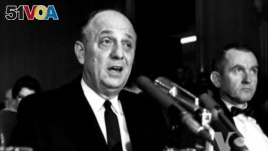January 15,2014
If there is one person whose work created a ripple effect that is changing the world, it was the ninth surgeon general of the United States. Fifty years ago this month, he issued a report that linked cigarette smoking to lung cancer and heart disease.
On a cold, rainy day at Arlington National Cemetery, people gathered to remember and honor a man who devoted his life to improving the health of others.
Surgeon General Luther Terry, now buried at the cemetery for military heroes, released a report in 1964 that linked smoking with cancer.

"President Kennedy ultimately selects him to be the ninth surgeon general," said Rear Admiral Boris Lushniak.
Acting Surgeon General, Rear Admiral Boris Lushniak, spoke of Dr. Terry's accomplishments.
"What took place 50 years ago changed the world. Fifty years ago, [it was a] completely different world when it comes to tobacco use and smoking," he said.
Smoking was accepted everywhere: in airplanes, in bars and restaurants and in work places.
"Statistically, almost half the U.S. adult population smoked at that point," said Lushniak.
And the other half, including children, breathed in toxic, smoke-filled air. It was part of the culture until Dr. Terry released the report produced by a committee of scientists.
“And the stand was, ‘It is definitive. There is a tie-in between tobacco use, smoking, lung cancer as well as heart disease.' And I think that really rattled the world that the U.S. government, specifically the surgeon general as a representative of the U.S. government, came out with such a strong stance," said Lushniak.
U.S. policies gradually changed... eventually mandating smoke-free areas in the work-place and elsewhere.
Education campaigns warned people of the dangers of tobacco use. In the past 50 years, more than three dozen surgeon generals' reports revealed more negative health effects of tobacco use. They found that even those who don't use cigarettes, but breathe in other's smoke, are exposed to serious health risks and deadly disease.
These policies have helped cut the rate of smoking in the U.S. from 43 percent to 18 percent, according to Dr. Lushniak. But stopping smoking is hard.
"Remember, this is not just a habit. This is an addiction. Fifty years from now, I would love to think we won’t have to issue a 100th anniversary report because the problem will have been solved," he said.
But the job isn't done. Five and a half million people die each year, including half a million Americans, because they used some form of tobacco or breathed someone else's smoke, and the number is expected to rise.
From 1964 on, Dr. Terry devoted his live to ending the smoking epidemic.